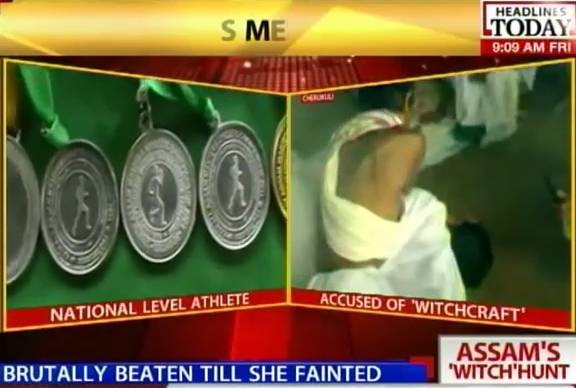India: Gold Medal Athlete Debjani Bora 'Severely Beaten' in Witch Hunting Attack

An Indian athlete has been severely beaten in a witch hunting attack.
Debjani Bora, a javelin thrower winner of several gold medals, said she was tied up and beaten after being branded a witch, following the death of four people in the Karbi Anglong village, Assam state, where she lives.
The four deaths included a person who committed suicide.
Bora was dragged from her house to the community prayer hall, where she faced "a public trial", the police report said.
Bora recounted her experience to journalists: "Instead of finding out why all the deaths occurred, some village elders suspected a witch was driving the people to death and organised a prayer. As the villagers were chanting hymns, one elderly woman identified me as the witch and shouted that I should be punished," she said.
"I was blamed for all these deaths in the village, wrapped up in fishing nets and beaten up severely."
A woman was arrested following the incident. Police say they suspect the woman incited the attack against Bora for personal reasons.
The athlete said she fears that the injuries sustained in the beating will prevent her from representing India in an upcoming Asian contest.
Witch hunting is widespread in India
Originally practiced by few tribes, witch hunting is on the rise in rural India, where at least 12 states have recently recorded cases of women being persecuted and killed for allegedly practising witchcraft.
The state where witch hunting is mostly practised is Jharkhand, where 54 women accused of witchcraft were killed last year.
In October 2013, a woman from the Shivni village fell ill. As villagers suspected the illness was due to witchcraft, a local shaman ordered that all the female villagers had to drink poison in a "witchcraft test."
Of the 30 women forced to drink the poison, 25 died.
At least 2,100 people have been murdered for "practising witchcraft" in India between 2000 and 2012, according to the Indian National Crime Records Bureau data.
As there is no specific law in India to protect people from witch hunting, the rate of conviction in cases of crime against alleged daayans, the term for Indian witches, is low (26.9 %).
A study published in the Journal of the North East India Studies explained that witch hunting cases are currently registered under sections which include: murder, grievous hurt, assault, criminal force to woman with intent to outrage her modesty, kidnapping for ransom and criminal intimidation.
© Copyright IBTimes 2025. All rights reserved.






















